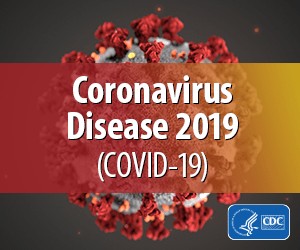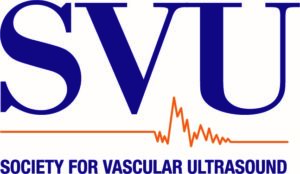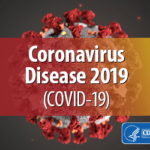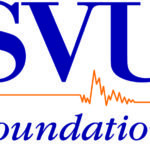Access a printer-friendly version of this statement here
Need help? Contact us via email at svuinfo@svu.org, or via the chat box in the lower right corner of your screen!
State of Emergency
The Coronavirus Disease 2019 (COVID-19) pandemic is a rapidly evolving situation affecting everyone. The Society for Vascular Ultrasound, like other professional organizations, is assisting members in responding. Guidance from the SVU is intended to be informational, not prescriptive.
Emergency Management Plans
For each vascular laboratory, the Medical Director and Technical Director have primary responsibility for implementing policies and directives from their organizations, government agencies, and public health officials.
This situation is dynamic. It should be recognized that resources, demands for services, and the threat level vary by location and they will vary over time. Each vascular laboratory will need to stay aware of changing recommendations and emergency public health orders, and they will need to continue to adjust their laboratory procedures as the situation changes.
Information Sources
The Centers for Disease Control and Prevention (CDC) has Information for Healthcare Professionals online. This site provides numerous helpful links.
Many State and County Health Departments’ web pages provide important guidance for specific jurisdictions and regions. These sources may include requirements specific to a vascular laboratory’s site of operations.
Professional societies are also providing information relevant to medical practices. The American College of Surgeons (ACS) is publishing updated information in its Bulletin.
The Department of Homeland Security is providing a Master Question List on COVID-19, updated weekly (most recent version: May 12th). SVU will post direct links to the updated versions of the list as they are made available.
Role of the Vascular Laboratory
Vascular laboratories are essential to high-quality, cost-effective vascular care. Much of what is done, however is not urgent. Most or all outpatient services should be deferred in areas where states of emergency exist, as have most elective surgery and outpatient procedures. Specifically, treatment and evaluation of claudication, venous procedures, screening tests, routine surveillance studies should not be done until restrictions are lifted. Endovascular interventions and minor procedures in ambulatory surgical centers (ASC) and office-based labs (OBL) are limited to essential care. Thus, vascular laboratory testing is to be curtailed.
The American College of Surgeons’ COVID-19 Guidelines for Triage of Vascular Surgery Patients lists categories of procedures for a variety of proceeds. Priority tiers are suggested:
(1) postpone, (2a) consider postponing, (2b) postpone, if possible, and (3) do not postpone.
In general, patients for whom care should not be postponed include those with vascular emergencies (ruptured or symptomatic aneurysms, acute limb ischemia) or symptomatic conditions (symptomatic carotid stenosis, infections, wounds associated with vascular disease). Vascular laboratory testing may be deferred for most Tier 1 and 2 patients who do not need immediate treatment.
Inpatient vascular laboratory services continue in most hospitals. Additional screening of requests for testing should be implemented to ensure appropriate use. Vascular ultrasound exams should only be performed if they are expected to provide significant clinical benefit. Limited examinations, when sufficient for clinical decision-making, may be performed rather than complete examinations. If the necessity for an examination is indeterminate, technologists or administrative staff should refer the request to the medical director of the vascular laboratory (or designee) for review.
In some settings (emergency rooms, intensive care units), trained clinicians may use point-of- care ultrasound (POCUS) to address specific questions. This may reduce the need for complete ultrasound examinations performed by vascular laboratory personnel, and thus reduce sonographers’ exposures to high-risk patients.
Prioritizing Health and Safety of Vascular Lab Staff
Health care workers, including vascular technologists and laboratory support staff, are committed to the service of others. In the current public health emergency, however, there is an immediate need to prioritize the health and safety of staff. Workers who are exposed to COVID-19 or those who become infected with the virus may suffer from the illness and may expose patients, co-workers, and family members. The adverse consequences are amplified unless containment procedures are followed.
Screening for COVID-19 Infection Risk
Prior to entering the facility and prior to entering examination spaces, all patients should be screened for COVID-19 symptoms, including upper respiratory symptoms, fever, and contact with infected persons.
Use of Personal Protective Equipment
Sonographers should follow standard precautions with all ultrasound exams. Training and updated information should be provided regarding institutional or lab protocols for standard, contact, droplet and airborne precautions.
The CDC has posted information on proper donning and doffing of PPE.
Reduced availability of face masks and other PPE may be a limiting factor in many patient care settings. Reducing the number of examinations performed may help decrease the need to use limited PPE supplies.
Cleaning and Decontamination
Routine cleaning should be intensified; cleaning of examination areas, workstations, counter-tops, and shared spaces should be increased.
Diagnostic equipment should be disinfected between each use, regardless of patients’ symptomatic status. Follow CDC and manufacturers’ guidelines for disinfection of equipment.
Education and Training
Diagnostic Medical Sonography (DMS) education programs may suspend students’ clinical rotations.
If sonography students are participating in clinical settings, they should not perform exams on COVID-19 patients to limit exposure and to reduce use of PPE.
The Joint Review Committee on Education in Diagnostic Medical Sonography has posted information for faculty, students and staff of DMS education programs.
Non-Patient Care Activities
During periods of limited or no patient care activities, vascular laboratory staff may consider attending to other work-related activities, including updating lab policies and procedures, quality improvement activities, and education via remote-learning options.
Importantly, plans for return to normal operations should be considered. A gradual easing of restrictions should be anticipated. Staff scheduling may continue to be complicated by the unknown status of community support services, child care, and other factors.
Vascular laboratories’ recovery planning should include a log of patients who had indicated testing deferred so they can be rescheduled when circumstances permit.
Communications
Society for Vascular Ultrasound members are encouraged to use UConnect to share useful information with the vascular laboratory community.
The American Registry for Diagnostic Medical Sonography (ARDMS) Coronavirus Discussion Group on Facebook is another source of shared information.
Members still have access to online resources, including the Journal of Vascular Ultrasound, other CME opportunities, the SVU Career Center, and more.
The SVU office will continues to operate throughout the COVID19 emergency. Staff are currently working remotely. While there may be some delays and disruptions in services, email communications can be sent to: svuinfo@svu.org
Society for Vascular Ultrasound
Revised May 18, 2020
Related Posts
-
Message to SVU Members from President Kelly Byrnes Regarding COVID-19
March 19, 2020 This is a difficult time for all of us. As healthcare professionals,…
-
Call for Proposals for the Vascular Laboratory Research Grant
The SVU Foundation sponsors a $5,000 grant given to a member to support research focused…
Related Posts
-
Message to SVU Members from President Kelly Byrnes Regarding COVID-19
March 19, 2020 This is a difficult time for all of us. As healthcare professionals,…
-
Call for Proposals for the Vascular Laboratory Research Grant
The SVU Foundation sponsors a $5,000 grant given to a member to support research focused…




